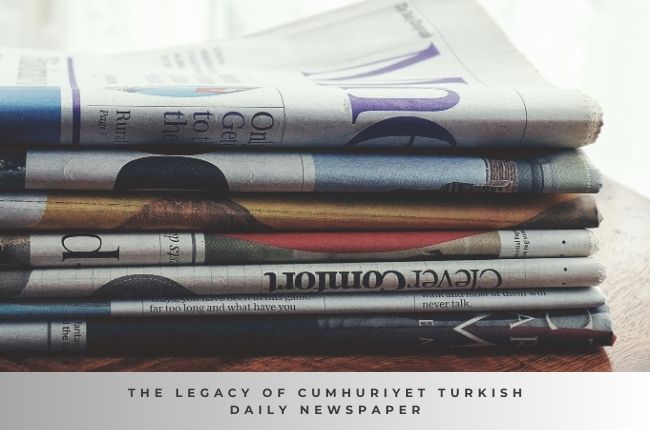Cumhuriyet, established on May 7, 1924, holds a significant place in Turkey’s media landscape as the oldest up-market Turkish daily newspaper. Founded by Yunus Nadi Abalıoğlu, a close associate of Mustafa Kemal Atatürk, Cumhuriyet has been a steadfast advocate for secularism, democracy, and freedom of the press. Over the decades, it has faced numerous challenges, including government crackdowns, censorship, and violence against its journalists. Despite these adversities, Cumhuriyet has maintained its commitment to investigative journalism and public interest reporting, making it a vital voice for democracy in Turkey. This blog post explores the Cumhuriyet newspaper’s historical context, its evolution, the challenges it has faced, and its enduring legacy in Turkish society.

Table of Contents
Historical Context
1. Founding and Early Years
Cumhuriyet was founded in the wake of the Turkish War of Independence, a period marked by the establishment of the Republic of Turkey. The newspaper’s inception was closely tied to the ideals of Atatürk, who championed secularism and modernization. Its first editor-in-chief, Zekeriya Sertel, emphasized the importance of a free press as a cornerstone of democracy. In its early years, Cumhuriyet served as a platform for progressive ideas and a voice for the republican cause.
2. Alignment with Kemalist Ideals
For much of its history, Cumhuriyet was aligned with the Kemalist Republican People’s Party (CHP), reflecting the party’s secular and nationalist principles. The newspaper was crucial in promoting Atatürk’s reforms, including women’s rights and educational advancements. A commitment to rationalism and a rejection of religious influence in governance characterized its editorial stance.
Evolution Over Time
1. Shift Towards Independence
As Turkey’s political landscape evolved, so did Cumhuriyet. By the late 20th century, the newspaper began to adopt a more independent editorial line, advocating for social liberal values and democracy. This shift was marked by its critical stance towards successive governments, particularly during periods of military rule and authoritarianism.
2. Investigative Journalism and Controversies
Cumhuriyet gained a reputation for its investigative journalism, often uncovering corruption and human rights abuses. Notable stories include its coverage of the 2014 National Intelligence Organisation scandal and the Panama Papers, which implicated high-profile Turkish figures. The newspaper’s willingness to challenge the status quo has often placed it at odds with the government, leading to significant backlash.
3. Challenges Faced
Government Crackdowns
The newspaper has faced numerous challenges, particularly under the leadership of President Recep Tayyip Erdoğan. Cumhuriyet has been described as a “high-profile target” in Erdoğan’s crackdown on media freedom. By the end of 2016, nearly half of its journalists and executives had been jailed, highlighting the risks faced by those committed to independent journalism in Turkey.
1. Violence Against Journalists
Throughout its history, Cumhuriyet has been the target of violence, including the assassinations of several prominent journalists and contributors. Uğur Mumcu, Bahriye Üçok, and Ahmet Taner Kışlalı are among those who lost their lives due to their commitment to exposing the truth. More recently, the newspaper’s headquarters was attacked in 2008, and there have been attempts on the lives of its journalists, such as the assassination attempt on Can Dündar in 2016.
The Role of Cumhuriyet in Contemporary Turkey
1. A Symbol of Resistance
Cumhuriyet has become a symbol of resistance against censorship and oppression in Turkey. Its commitment to freedom of expression and investigative reporting resonates with many Turks who value democratic principles. The newspaper’s motto, “Truth is a necessity,” underscores its dedication to uncovering facts and holding power accountable.
2. Awards and Recognition
In recognition of its courageous journalism, Cumhuriyet received the Freedom of Press Prize from Reporters Without Borders in 2015 and the Right Livelihood Award in 2016, often referred to as the “Alternative Nobel Prize.” These accolades highlight the newspaper’s role in promoting human rights and freedom of expression, despite the risks involved.
The Legacy of Cumhuriyet
1. Impact on Turkish Society
Cumhuriyet’s legacy extends beyond its reporting; it has shaped public discourse in Turkey for nearly a century. The newspaper has fostered a culture of critical thinking and debate, encouraging readers to engage with pressing social and political issues. Its influence can be seen in the emergence of a more informed citizenry that demands accountability from its leaders.
2. The Future of Cumhuriyet
As Turkey continues to grapple with issues of press freedom and democracy, Cumhuriyet’s role remains crucial. The newspaper’s commitment to independent journalism serves as a beacon of hope for those advocating for a more democratic and pluralistic society. While challenges persist, the spirit of Cumhuriyet endures, inspiring future generations of journalists and activists.
Key Milestones in the History of Cumhuriyet
Founding and Early Years (1924-1945)
– Cumhuriyet was established on May 7, 1924, by journalist Yunus Nadi Abalıoğlu at the initiative of Mustafa Kemal Atatürk.
– Zekeriya Sertel served as the founding editor-in-chief, emphasizing the importance of a free press as a cornerstone of democracy.
– In its early years, Cumhuriyet promoted Atatürk’s reforms and the republican cause.
Ownership Changes (1945-2001)
– After Yunus Nadi died in 1945, the newspaper was owned by his eldest son Nadir Nadi Abalıoğlu until 1991.
– Nadir Nadi’s wife Berin then published Cumhuriyet until she died in 2001.
– Since 2001, Cumhuriyet has been owned by the Cumhuriyet Foundation.
Challenges and Assassinations (1970s-1990s)
– Several Cumhuriyet contributors were assassinated between the 1970s and 1990s, including Uğur Mumcu, Bahriye Üçok, Ahmet Taner Kışlalı, and others.
– During the Gulf War in 1991, Cumhuriyet faced a collapse in advertising revenue and a dispute over editorial policy that led to the resignation of editor-in-chief Hasan Cemal.
Relocation and Format Change (2005-2010)
– In 2005, Cumhuriyet moved its headquarters from Cağaloğlu to Istanbul’s Şişli district.
– In 2010, the newspaper abandoned the broadsheet format for the midi-sized Berliner format, becoming one of the first up-market newspapers in Turkey to do so.
Awards and Recognition (2015-2016)
– In 2015, Cumhuriyet received the Reporters Without Borders’ Freedom of Press Prize.
– In 2016, the newspaper was awarded the Right Livelihood Award, often referred to as the “Alternative Nobel Prize”.
Centennial Celebration (2024)
– In 2024, Cumhuriyet celebrated its 100th anniversary, with the current editor-in-chief Mine Esen reaffirming the newspaper’s commitment to Atatürk’s path and the principles of democracy and secularism.
FAQs
Q1. What is the significance of Cum huriyet in Turkish journalism?
Cumhuriyet is considered Turkey’s oldest up-market daily newspaper and has played a pivotal role in promoting secularism, democracy, and freedom of the press since its founding in 1924.
Q2. Who founded Cum huriyet and when?
Cum huriyet was founded on May 7, 1924, by journalist Yunus Nadi Abalıoğlu, a close associate of Mustafa Kemal Atatürk.
Q3. How has Cum huriyet been targeted by the government?
Cumhuriyet has faced significant government crackdowns, including the imprisonment of its journalists and executives, particularly under the Erdoğan administration, which has sought to suppress dissenting voices in the media.
Q4. What awards has Cum huriyet received for its journalism?
Cumhuriyet has received several prestigious awards, including the Freedom of Press Prize from Reporters Without Borders in 2015 and the Right Livelihood Award in 2016, recognizing its commitment to investigative journalism and freedom of expression.
Q5. What is the legacy of Cumhuriyet in contemporary Turkey?
Cumhuriyet’s legacy is one of resilience and resistance against censorship. It has fostered a culture of critical inquiry and debate, influencing public discourse and inspiring future generations to uphold democratic values and human rights.



